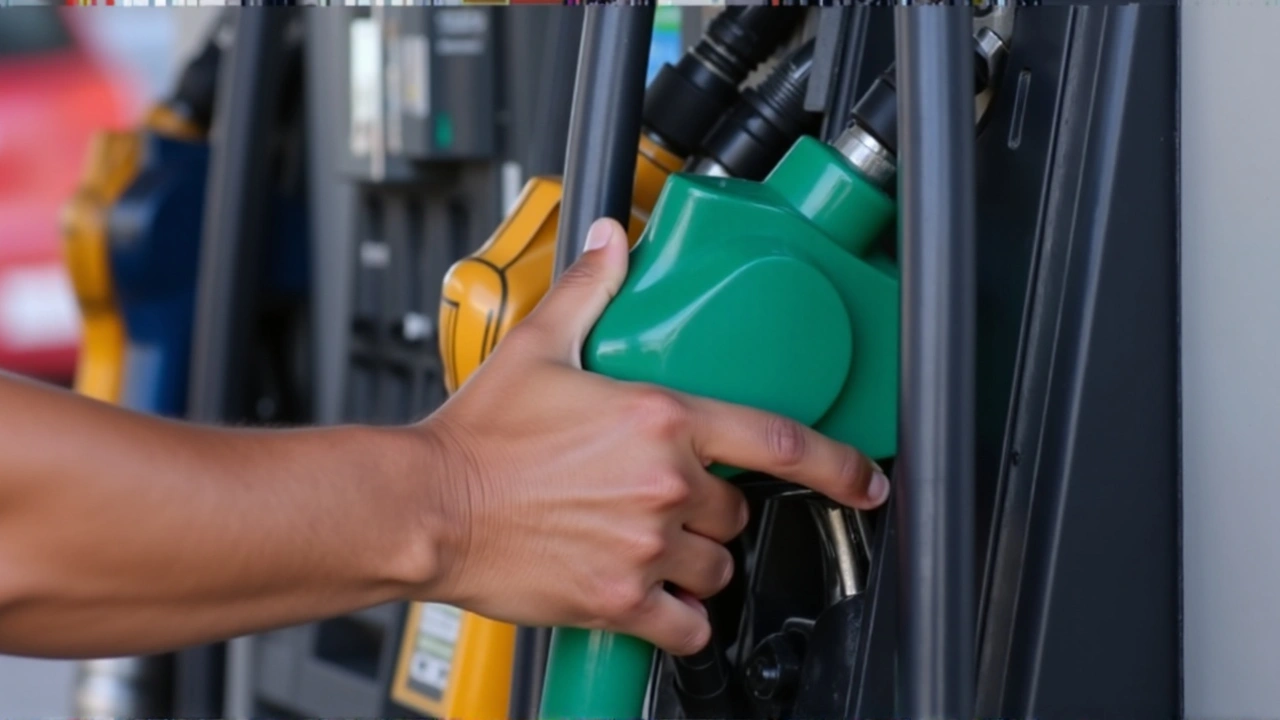August Fuel Prices Announced by EPRA: Key Insights into Petrol, Diesel, and Kerosene Adjustments

EPRA’s August Fuel Price Adjustment
The Energy and Petroleum Regulatory Authority (EPRA) has made public the fuel prices for August 2024. This announcement follows their regular monthly review of fuel prices in the Kenyan market. In the latest update, the authority has revealed marginal increases in prices for petrol, diesel, and kerosene. Effective from August 15, 2024, these prices will remain in effect until September 14, 2024.
Key Changes in Fuel Prices
According to EPRA, petrol prices have gone up by Ksh 1.50 per liter, resulting in a new price of Ksh 221.14 per liter. Diesel prices have increased by Ksh 2.20 per liter, now retailing at Ksh 203.99 per liter. Similarly, kerosene prices have seen an uptick of Ksh 2.50 per liter, setting the new price at Ksh 205.61 per liter. These adjustments are a reflection of varied contributing factors, both domestic and international.
Factors Influencing the Price Hike
Several factors have contributed to the fuel price hike this month. A significant element is the average landed cost of imported petroleum products. These costs have risen due to global market conditions, including changes in supply and demand dynamics across the international energy market. The global price of crude oil has experienced fluctuations, with implications on the end consumer prices.
Another critical element is the Kenyan government's recent removal of fuel subsidies. Subsidies had previously cushioned the Kenyan populace from steep international price changes, and their removal means the local prices are now more closely linked to global trends. This policy shift aims to foster a more sustainable economic environment, despite its immediate financial burden on households and businesses.
Implications for Consumers and Businesses
The current increase in fuel prices is expected to have wide-ranging impacts on both consumers and businesses. For consumers, the rise in petrol, diesel, and kerosene prices means a higher cost of transportation and household energy needs. This shift may burden many households financially as they navigate these higher day-to-day expenses.
For businesses, particularly those dependent on fuel for logistics and operational activities, increased fuel costs could mean higher operational expenses. Transport companies, manufacturing firms, and small enterprises reliant on kerosene for energy are likely to feel the impact. This could, in turn, affect the pricing of goods and services, potentially contributing to inflationary pressures in the economy.
Broader Economic Impact
The broader economic impact of rising fuel prices can be significant. Economists often refer to fuel prices as a key indicator of economic health. Higher fuel costs can lead to increased production and transportation costs, which may be passed on to consumers in the form of higher prices for goods and services. This sequence of events can contribute to inflation, straining the purchasing power of consumers.
While inflation is a potential concern, the removal of subsidies and the linkage of local prices to global trends could also drive efficiency and innovation within the economy. Businesses and consumers might become more inclined to adopt energy-saving measures or invest in alternative energy sources, spurring growth in these sectors.
The Role of EPRA
EPRA's role in regulating fuel prices is critical in maintaining a balance between reflecting global market realities and ensuring affordability for local consumers. The authority's monthly reviews and adjustments aim to keep the pricing structure responsive to international market changes while also being mindful of the local economic context.
In their announcement, EPRA emphasized the importance of understanding the intricate link between local and global factors that influence fuel prices. This transparent approach is crucial for fostering public awareness and understanding of the economic interplay driving price adjustments.
Looking Ahead: Sustainable Solutions
As Kenya grapples with these changes, the need for sustainable solutions becomes evident. Exploring alternative energy sources, boosting local energy production, and enhancing energy efficiency can help mitigate the economic strain caused by such price hikes. Investments in renewable energy technologies, such as solar and wind power, could provide long-term relief and promote a greener, more resilient energy sector.
Furthermore, driving policy initiatives that encourage energy-saving practices and support for innovations in the energy sector could play a pivotal role in cushioning the economy from volatile global oil prices. It is a multifaceted approach that requires collaboration between government, businesses, and the public.
Conclusion
The recent adjustment of fuel prices by EPRA is a reflection of current global and local market conditions. While the price hikes pose challenges, they also underscore the importance of sustainable and resilient energy strategies. As we navigate these changes, it is crucial to consider both the immediate economic impacts and the long-term opportunities for innovation and growth in the energy sector.






Anthony Morgano
August 15, 2024 AT 00:26Looks like we’ll all feel the pinch at the pump 😅
Holly B.
August 15, 2024 AT 01:26While the price hike is unfortunate it can be managed with careful budgeting. Consider reducing non‑essential trips and exploring car‑pool options. Also keep an eye on fuel‑efficient routes at work. Small adjustments can lessen the overall impact.
Lauren Markovic
August 15, 2024 AT 02:33Hey folks, the new EPRA numbers are out and it’s a mixed bag 😊. Petrol is up by Ksh 1.50, diesel by Ksh 2.20 and kerosene even a tad higher. That might sound small, but when you do the math for a week’s worth of commuting or a month of running a generator, it adds up fast. It’s also a clear sign that the subsidy removal is really being felt on the ground. For those of us who rely on diesel trucks for deliveries, budgeting now has to factor in that extra cost. On the bright side, this could be the push we need to look at hybrid or electric options where feasible. If anyone has tips on fuel‑saving drives or alternative energy sources, drop them here! 🚗💡
Kathryn Susan Jenifer
August 15, 2024 AT 03:40Oh great, another price hike – just what we all needed to boost morale! 🙄 It’s almost theatrical how they announce “marginal” increases while the drama unfolds at the pump. I guess the real plot twist is how quickly people will start searching for the nearest black market diesel. Let’s hope the government’s “sustainable solutions” aren’t just a fancy curtain call. If only the sarcasm could lower the price!
Jordan Bowens
August 15, 2024 AT 04:46Fuel prices climbing again-just what we needed.
Kimberly Hickam
August 15, 2024 AT 06:10Honestly, the whole subsidy debacle is just a playground for the powers that be to test how much pain the average Kenyan can endure. When you look at the global oil market you see a roller‑coaster that no one asked for, yet governments love riding it to justify their endless tax hikes. EPRA’s polite press release hides the fact that every extra shilling per liter translates into a concrete loss for families scraping by. If you think the increase is marginal, remember that a liter of petrol fuels a commuter’s day, a truck’s route, and a generator’s night. Multiply that by millions of users and the hidden cost balloons into a macro‑economic irritant that fuels inflation. What’s more, the removal of subsidies is marketed as ‘efficiency’ while it actually caps the poorest in a new kind of energy poverty. The clever spin is that market forces will force innovation, but the reality is people will cut corners, cheat, or just stop using energy altogether. Solar panels and wind farms sound great on paper, but they require capital that most small businesses simply don’t have. In the short term, you’ll see black market diesel, illegal refineries, and a spike in vehicle maintenance scams. Long term, the country might finally be pushed toward renewable investments, but that’s a distant promise that won’t pay the fuel bill today. Meanwhile, transport companies will pass the cost onto consumers, making food and goods pricier, and the cycle continues. So what’s the solution? A mix of transparent pricing, targeted relief for the most vulnerable, and a serious push for diversified energy sources. Otherwise, we’re just watching a textbook example of how policy can betray the very people it claims to serve. And let’s not pretend that EPRA isn’t also a bureaucratic beast that thrives on justification for every tiny adjustment. In the end, the market will adjust, but the human cost is the real price tag that no spreadsheet can capture. Bottom line: brace yourself, demand accountability, and keep an eye on where the next extra shilling will show up.